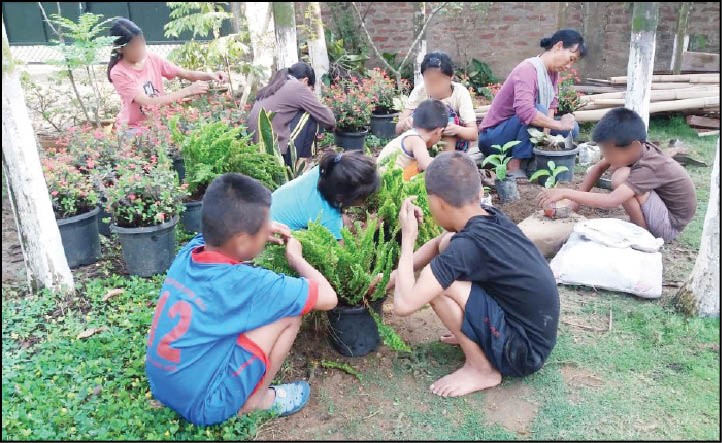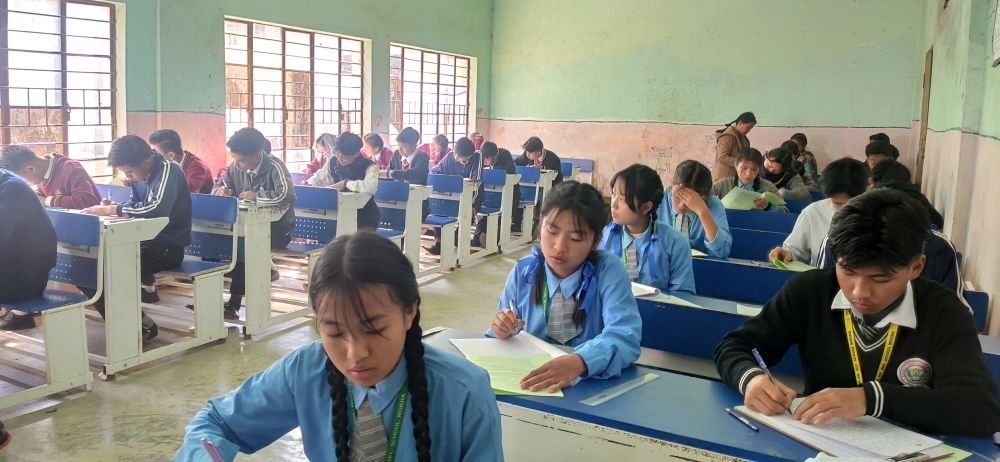NK Keny works in a garden at Love Care Home with children in need of care. Mother’s Day gives us an opportunity to acknowledge the work of mothers who go beyond biological duties to give unconditional love and care to children despite any social status or recognition. (Photo Courtesy: Love Care Home)

The biological full-familied mother is noble but is a single mother or foster mother any less so?
Morung Express Feature
Dimapur | May 11
Emy married in 2006 and separated in 2013. In that time, she had two children while consistently being abused by an alcoholic husband. When she finally decided to break free, her husband’s family wanted the custody of both the children. Emy fought back and managed to secure custody of her younger child, but bringing him up was no cake walk.
“Thank God I have at least one of my children. I was left with no money or financial help after our separation. At first I ran a second hand clothing business,” says Emy, a single mother who now runs a paying guest/hostel in Dimapur. Her child is now in Class 4 and has a serious medical condition.
“We get by, thanks to my siblings and parents who help out,” acknowledges Emy. Her ex-husband provides no help; despite this, it is easier for her child to keep his father’s name. With little respect and social status accorded to single mothers, Emy’s choices are slim. Barring her child/ren, nobody will remember her this Mother’s Day.
But Emy couldn’t care less. “I had rather be a single mother than get abused every day,” she affirms, while also wishing society recognizes the “huge labour” that single mothers put in to raise their children, filling the shoes of both parents. “I just teach my child to never be like his father and to respect all women, all people.”
Hurdles: family, society, state, church
Rebecca (name changed), also a single mother, had a four way challenge, exposing her to ill health and depression. The father of her child asked for the baby to be aborted but she refused. Left to herself with the decision, Rebecca was shunned for “bringing shame” to her family, had to hide from society throughout her pregnancy, the church excommunicated her and now the State has denied her child an Indigenous Certificate despite both parents being Naga. Meanwhile, the man carried on his life with impunity, without having to bear any burden.
Rebecca didn’t lose courage. “I will apply for guardianship of my child so I have full custody till the child is 18 years of age,” she says, lest the biological father’s family lays sudden claim—customary laws allow men exemplary rights over a child.
In Nagaland’s case, even the State recognizes the child’s indigeneity only through a father’s name. “The father abandoned us. I refuse to give my child his name,” maintains Rebecca. Policy makers of Nagaland State are all men, and though they sing hymns for their own mothers publicly, scant regard is shown to issues faced by other struggling mothers.
As for the society and church, she says, “I was vulnerable; all I needed was some solidarity and support. Instead, punitive action was taken against me.”
Support eventually came from her family; around a warm hearth, she manages to shield her child from the bitterness and pain Rebecca continues to face. This Mother’s Day, and every other day, she teaches her child to “pray and be grateful.”
“I give my child many affirmations and applause achievements. My child should grow up to feel loved and confident,” asserts Rebecca between lumps in her throat.
The foster mother
Faced with barbed hostilities, Rebecca’s child was fortunate not to be abandoned by her. Others are not so fortunate – the daunting task of childcare compels some to walk away from their newborns. Often, other mothers take up the willful responsibility of caring for such children.
M Lotha, for instance, brought home an infant abandoned at birth in Dimapur. A government lower primary school teacher in Diphu, the grapevine brought her news of a baby who had been crying for three days in a Naga household in Dimapur. She and her husband already had a son but their compassion stirred when they heard of the abandoned child.
“I could not breastfeed him when we brought him home to Diphu but formula drinks worked just fine,” she says, with a sense of pride at how well the child is doing today, studying in Class 10. “He performs astonishingly well in academics and is just as good at sports and painting,” notes Lotha, who has fostered her adopted son with the same essence of motherhood she’s injected in her biological son. This is uncommon in a society that is reluctant to adopt sons.
If this is an example of unconditional love, NK Keny takes it forward to its logical end. She currently takes care of 17 homeless children at Love Care Home, which has had 57 children sheltered in its warmth, till the age of 18, since its inception in 2005. Keny, a woman single by choice, imparts motherhood as magnanimous as any biological mother – perhaps even more – but does not confuse the children under her care by asking them to call her ‘Ama.’ Children here say they have only two best friends, Jesus Christ and ‘Miss,’ as Keny is known to them.
“These children have come here after facing lots of trauma. Some have deep seated feelings of revenge,” explains Keny. As a foster care-giver, she has the added responsibility to walk them through this emotional challenge. “I need to teach them to love and overcome these feelings. I tell them that God provided this home for you and me,” she says, noting that these children have faced such hardship at a young age that if they turn out well, they can contribute much to society but if they do not, things can go downhill quickly.
At Love Care Home, the children work collectively – study, tend to a vegetable garden for food, compost organic waste, pray, cook, clean.
“In the future, they should know how to survive without depending on others,” declares Keny, who is often asked by society’s moral preachers what’s wrong with her that she has not married. “I tell them my mind and body are in perfect condition but my life is dedicated to children.”
As Dolly Kikon, who fosters her brother’s children, puts it, “it is ultimately love that defines us, not tags about what our body can produce or not.”
To all of them, a Happy Mother’s Day!


.jpg)
.jpg)
.jpg)
